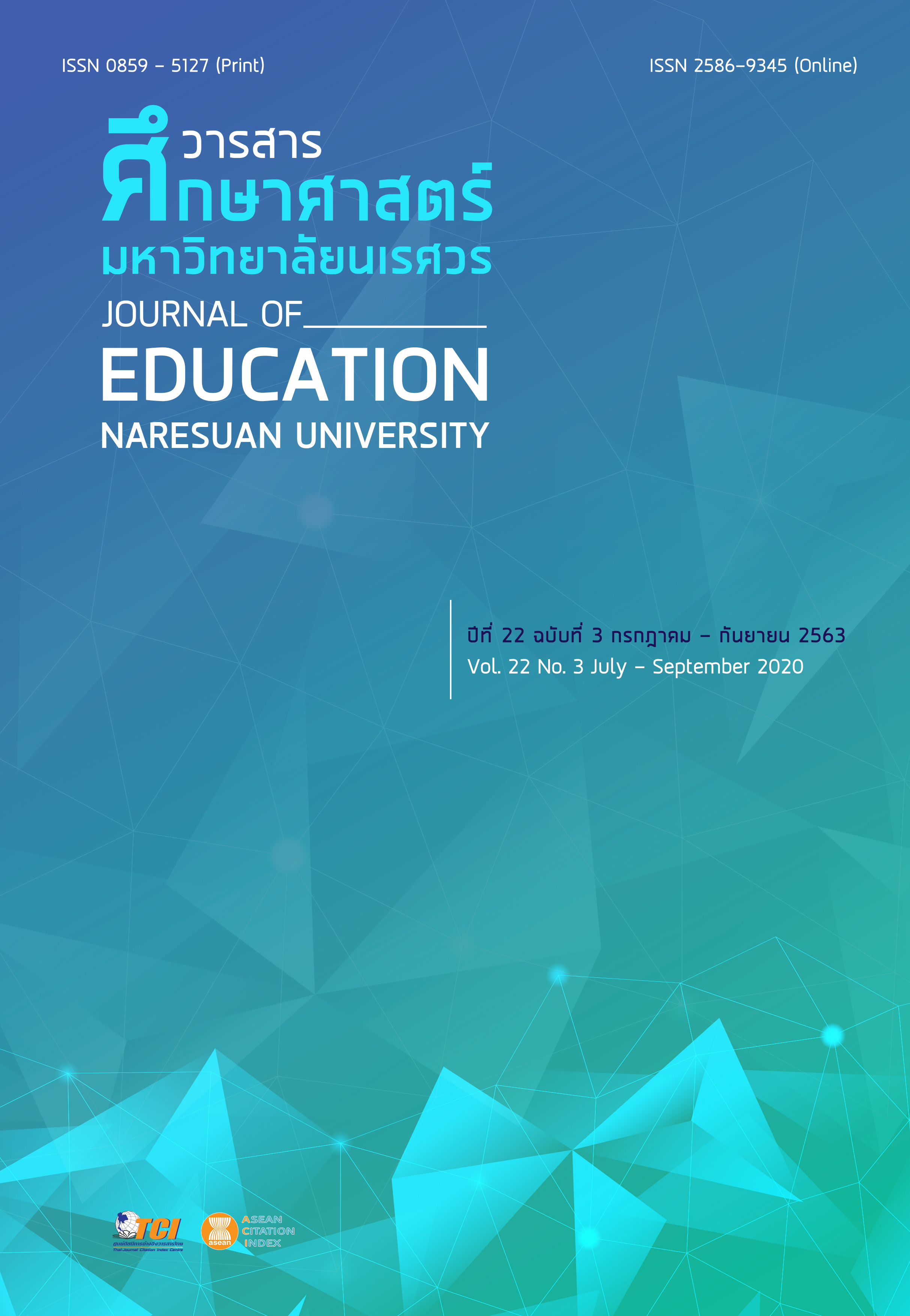SCIENCE TEACHERS’ VIEW ON LEARNING MANAGEMENT IN ENRICHMENT SCIENCE CLASSROOM มุมมองของครูวิทยาศาสตร์ต่อการจัดการเรียนรู้ห้องเรียนพิเศษวิทยาศาสตร์
Main Article Content
Abstract
This qualitative research aimed to investigate science teachers’ view on learning management in science classroom. The participants were 8 teachers who teach science on science classroom. Data was collected using semi-structured interview. The information and data were analyzed by content analysis. The results of this research indicate that 1) characteristics of science students divided into 2 groups: having scientific ability and no scientific ability. Almost students have characteristics consistent with the nature of the scientist. 2) The curriculum has additional subjects but students will develop or not depends on teachers. 3) There are a variety of learning activities that different from the regular classroom. And the teachers who attended the teachers’ training programs have developed their own more. 4) The technology was applied to attract the attention of the students. The use of the media and the learning resources were in English language. 5) The science teachers used a variety of methods as well as authentic assessments were used for learning assessments. 6) The science teachers were encourage to offer a variety of co-curricular activities such as, science camp, field trip, or internship at university. And 7) The selection of the children into science classroom were not meet the purpose. There are many science schools so this curriculum should was publicized widely. The teachers who teach the science classroom were proper qualifying.
Article Details
The owner of the article does not copy or violate any of its copyright. If any copyright infringement occurs or prosecution, in any case, the Editorial Board is not involved in all the rights to the owner of the article to be performed.
References
Chindanurak, T. (2016). Innovation and Media in Science Teaching and Learning in the 21st Century. Veridian E-Journal, Silpakorn University, 9(1), 560-581. [in Thai]
Dewitt, J., & Osborne, J. (2010). Supporting teachers on science-focused school trip: Towards an integrated framework of theory and practice. International Journal of Science Education, 29(6), 685-710.
Magnusson. S., Krajcik, J., & Borko H. (1999). Nature, sources, and development of pedagogical content knowledge for science teaching. In J. Gess-Newsome and N. G. Lederman (Eds.) Examining Pedagogical Content Knowledge. Science & Technology Education Library, vol 6. Springer, Dordrecht.
Joyrung, N., Chauvatcharin, N., & Sirisawad, C. (2018). A Study of biology learning achievement and group process skills of a special scientific course 10th grade students by using cooperative learning TGT technique. Journal of Education Naresuan University, 20(2), 75-88. [in Thai]
Lekatarakorn, P. (2015). Enjoy Learning in 21st Century. Journal of Education Naresuan University, 17(3), 161-163. [in Thai]
McClelland, D. C. (1961). The achieving society. Princeton, NJ: Van Nostrand Rinehold.
Ministry of Education. (1997). Measurement and evaluation of the actual condition of the students. Bangkok: Kurusapa Printing Ladphrao. [in Thai]
Ministry of Education. (2010). Guidelines for open classes in basic education institutions affiliated with the committee for basic education. Bangkok: The Agricultural Cooperative Federation of Thailand. [in Thai]
Office of the Education Council. (1999). The reform of science education in the United States. Searched on October 18, 2561 from http://www.onec.go.th/publication/4216002/index_executive.him [in Thai]
Office of the Education Council. (2010). Education Plan (B.E. 2552- 2559). Bangkok: Prikwhan Graphic. [in Thai]
Promkatkeaw, T., Sungong, S., & Kaewviyudth, S. (2007). Development of Semi-structured Interviews for Studying Conceptions and Instruction of the Nature of Science. Songklanakarin Journal of Social Sciences and Humanities, 13(4), 513-523. [in Thai]
Singhan, S. (2016). A Study on state and problems of the implementation of enrichment science classroom curriculum at Nawamintrachinutid Bodindeche School. An Online Journal of Education, 11(3), 29-44. [in Thai]
Sukjairungwattana, T. (2010). A study of factors influencing to well learning behavior of Mathayomsuksa 3 students under Office of the Private Education Commission in Nakhon Pathom Province. Silpakorn educational research journal, 1(2), 126-139. [in Thai]
The institute for the Promotion of Teaching Science and Technology. (2012). Curriculum special classroom science standards for high school according to the Institute for the Promotion of Teaching Science and Technology Act B.E. 2555. Bangkok: The institute for the Promotion of Teaching Science and Technology. [in Thai]
Tothonglang, J. (2015). A Study on state and problems of implementation of enrichment science classroom in Yothinburana School under the Secondary Educational Service Area Office 1. An Online Journal of Education, 10(4), 14-16. [in Thai]
Vichaidit, C. (2017). Exploring orientations toward STEM Education of pre-service science teachers. Rajabhat Mahasarakham University Journal Humanities and Social Sciences, 11(3), 165-177. [in Thai]
Wongyai, W. (2011). The development of higher education. Bangkok: R & N Print. [in Thai]


